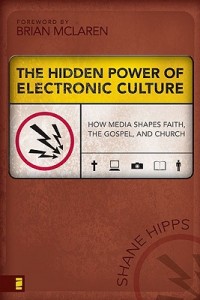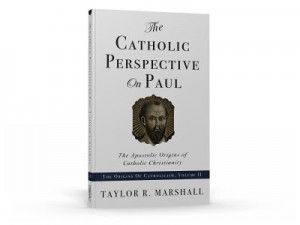Here at LifeWay, several of us guys meet once a week to discuss the books we’ve been reading. I am blogging about our conversation as a service to readers of Kingdom People. At our first meeting, we talked about books by John Grisham, John Piper, H.G. Wells, and more. Here is the rundown of our second meeting, where we talk about Narnia, the power of media, and the “Catholic Perspective” on Paul.
 The Magician’s Nephew
The Magician’s Nephew
C.S. Lewis
Micah Carter announced that he was (for the first time!) reading through The Chronicles of Narnia. Before he could tell us much about The Magician’s Nephew, we had a discussion about the order one should read the Narnia books. Both Philip Nation and I agreed that the Narnia books should be read in the order they were published, not in the chronological order that Lewis endorsed later on in his life. It may not seem like a big deal, but we believe that a reader will enjoy The Magician’s Nephew much more if he or she already knows the story of The Lion, The Witch, and the Wardrobe.
Regarding the Narnia stories, Micah made the point that we theologian-types always analyze stories for their theology. Instead, we ought to be able to read the stories as just stories, terrific tales that sweep us up into the narrative. Ironically, after we all agreed on the power of the story as mere story, we began discussing the theology in The Magician’s Nephew!
Micah noticed traces of the doctrine of effectual calling in this book. When Aslan calls Polly, Lewis writes: “She felt sure it was a call, and that anyone who heard that call would want to obey it, and (what’s more) would be able to obey it, however many worlds and ages lay between.”
But this beautiful picture of effectual calling goes hand in hand with human responsibility for rebellion. Speaking of Uncle Andrew, Aslan says, “He has made himself unable to hear my voice. If I spoke to him, he would hear only growlings and roarings. Oh, Adam’s sons, how cleverly you defend yourselves against all that might do you good!” And when it comes to heaven or hell, Aslan says “All get what they want; they do not always like it.”
 Our discussion of Narnia brought up the book, Planet Narnia: The Seven Heavens in the Imagination of C. S. Lewis
Our discussion of Narnia brought up the book, Planet Narnia: The Seven Heavens in the Imagination of C. S. Lewis by Michael Ward. Philip and Micah were skeptical that someone could “unlock” a secret interpretation of the Narnia books. I assured them that Planet Narnia isn’t so much about secret interpretations as much as it is about discerning the “mood” and “atmosphere” of each Narnia tale – a mood which corresponds to the seven heavens.
As I began the book, I too thought, “What’s so compelling about pointing out some veiled references to Jupiter or Mars?” But the more I read, the more I realized that Lewis’ astrological awareness combined with Ward’s massive amount of evidence makes for a very solid case.
The Hidden Power of Electronic Culture:
How Media Shapes Faith, the Gospel, and Church
Shane Hipps (2005)
 Philip Nation brought a book by Shane Hipps that was released in 2005 when the Emerging Church conversation was at its peak. We talked about all the changes that had taken place since 2005, not only regarding theological movements (the EC is over in many respects) but also technology. Though this book about media came out just five years ago, there is nothing here about Twitter or smart phones. Technology is progressing by leaps and bounds, changing our lives at a pace too rapid to fully comprehend.
Philip Nation brought a book by Shane Hipps that was released in 2005 when the Emerging Church conversation was at its peak. We talked about all the changes that had taken place since 2005, not only regarding theological movements (the EC is over in many respects) but also technology. Though this book about media came out just five years ago, there is nothing here about Twitter or smart phones. Technology is progressing by leaps and bounds, changing our lives at a pace too rapid to fully comprehend.
Hipps is an advocate of the idea that “the medium is the message.” He makes the point that the task of God’s mission is given to the church, not mere individuals. Philip was particularly impressed by Hipps’ insight that people find it difficult to believe in or understand a meta-narrative because we are overloaded with disparate sources of information. People aren’t able to take all the information they process and put it together into a coherent framework or worldview.
Hipps also recommends we consider the ecology of media by asking four questions:
- What does the medium extend?
- What does the medium make obsolete?
- What does the medium reverse into?
- What does the medium retrieve?
Hipps sounds a lot like Andy Crouch in the way he seeks to analyze the cultural impact of new media. When it comes to preachers beaming themselves through video screens to other congregations, Hipps makes a point that made us all a bit uncomfortable, even as we recognized there is some truth to it:
“The medium itself
nurtures an elite priestly class in which the preacher is set apart from the people. With video venues we can say goodbye to the priesthood of all believers and hello to the papacy of celebrity.” (152)
Philip cautioned that a book like this needs to be read discerningly. Still, he found some very helpful insights here.
 The Catholic Perspective on Paul:
The Catholic Perspective on Paul:
Paul and the Origins of Catholic Christianity
Taylor Marshall
I brought with me a book by Taylor Marshall, a convert to Catholicism who credits the theology of N.T. Wright and other New Perspective authors with becoming a bridge to Catholicism. In the Acknowledgements, Marshall says, “I am grateful to N.T. Wright, E.P. Sanders, and James D.G. Dunn for dismantling the Protestant consensus regarding Saint Paul.” These are charged words. People like Peter Enns, Richard Gaffin, and Peter Leithart may be surprised to find themselves acknowledged too.
The Catholic Perspective on Paul is an attempt to ground Catholic theology and practice in the letters of Paul. He sees the doctrine of participation at the heart of Paul’s theology. He accuses Martin Luther of doctoring the text in order to make “faith alone” more prominent. Each chapter of the book seeks to trace Catholic theology back to Paul, including doctrines like baptismal regeneration, Purgatory, transubstantiation, priestly celibacy, etc. The book ends with an appendix in which Marshall includes 10 questions for N.T. Wright regarding Catholicism and its distinctions from Protestantism.
I knew when I received this book that I would be reading an apologetic for Catholic theology. What surprised me was how much this book confirmed my Protestant beliefs! In an indirect way, Marshall’s case reaffirmed my Protestantism by demonstrating how much of the Catholic theological edifice is built upon brief texts, mere phrases, or words whose original meanings are obscure. (Example: The full-blown doctrine of Purgatory is assumed and built upon elaborate interpretations one or two vague references). In the end, Marshall’s apologetic reminded me of the importance of seeking to study Scripture without imposing a theological framework (whether it be Calvinism, Dispensationalism, Catholicism, etc.) upon the text.


















